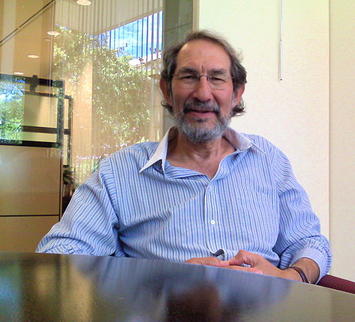
You may remember Geoffrey West from his TED Talk about the scaling laws of cities that got a lot of press a while back. He has now turned his research findings into a book. Famed physicist Freeman Dyson just reviewed it for the New York Review of Books. His review includes this curious section about genetic drift I found interesting. This is something I’d be interested in hearing more about from geneticists.
"West presents in his Figure 45 the scaling law relating the number of telephone conversations in cities to the number of inhabitants. The number of conversations scales with the 1.15 power of the population. The law is exactly the same in the two countries, Britain and Portugal, that maintain the most complete record of telephone calls. West considers telephone conversations to be a good indication of quality of life. More conversations mean more social interaction, more business deals, more exchange of ideas—more opportunities for individuals to push the society forward. His word “buzz” expresses his vision of the great city as the place where human progress happens. He sees the nonlinear scaling law confirming his view that the great city empowers each individual inhabitant to be a more effective innovator.
West does not mention another scaling law that works in the opposite direction. That is the law of genetic drift, mentioned earlier as a crucial factor in the evolution of small populations. If a small population is inbreeding, the rate of drift of the average measure of any human capability scales with the inverse square root of the population. Big fluctuations of the average happen in isolated villages far more often than in cities. On the average, people in villages are not more capable than people in cities. But if ten million people are divided into a thousand genetically isolated villages, there is a good chance that one lucky village will have a population with outstandingly high average capability, and there is a good chance that an inbreeding population with high average capability produces an occasional bunch of geniuses in a short time. The effect of genetic isolation is even stronger if the population of the village is divided by barriers of rank or caste or religion. Social snobbery can be as effective as geography in keeping people from spreading their genes widely.
A substantial fraction of the population of Europe and the Middle East in the time between 1000 BC and 1800 AD lived in genetically isolated villages, so that genetic drift may have been the most important factor making intellectual revolutions possible. Places where intellectual revolutions happened include, among many others, Jerusalem around 800 BC (the invention of monotheistic religion), Athens around 500 BC (the invention of drama and philosophy and the beginnings of science), Venice around 1300 AD (the invention of modern commerce), Florence around 1600 (the invention of modern science), and Manchester around 1750 (the invention of modern industry).
These places were all villages, with populations of a few tens of thousands, divided into tribes and social classes with even smaller populations. In each case, a small starburst of geniuses emerged from a small inbred population within a few centuries, and changed our ways of thinking irreversibly. These eruptions have many historical causes. Cultural and political accidents may provide unusual opportunities for young geniuses to exploit. But the appearance of a starburst must be to some extent a consequence of genetic drift. The examples that I mentioned all belong to Western cultures. No doubt similar starbursts of genius occurred in other cultures, but I am ignorant of the details of their history.
West’s neglect of villages as agents of change raises an important question. How likely is it that significant numbers of humans will choose to remain in genetically isolated communities in centuries to come? We cannot confidently answer this question. The answer depends on unpredictable patterns of economic development, on international politics, and on even more unpredictable human desires. But we can foresee two possible technological developments that would result in permanent genetic isolation of human communities."
Click through to read the whole thing.
This piece originally appeared on Urbanophile.
Aaron M. Renn is a senior fellow at the Manhattan Institute, a contributing editor of City Journal, and an economic development columnist for Governing magazine. He focuses on ways to help America’s cities thrive in an ever more complex, competitive, globalized, and diverse twenty-first century. During Renn’s 15-year career in management and technology consulting, he was a partner at Accenture and held several technology strategy roles and directed multimillion-dollar global technology implementations. He has contributed to The Guardian, Forbes.com, and numerous other publications. Renn holds a B.S. from Indiana University, where he coauthored an early social-networking platform in 1991.
Photo: Geoffrey West. Photo Credit: Steve Jurvetson, CC BY 2.0













Cause and effect
From Dyson's review: West loves big cities and uses his scaling laws to demonstrate their superiority as habitats for human societies.
This statement was obvious from the outset. The order Love, Demonstration of Superiority is hardly accidental or irrelevant. There's something E O Wilson-ish about West's hypothesis. Ant colonies, anthills and beehives have always exerted a peculiar attraction on the Pythagorean mind.
While I commend the continued pursuit by people like West of the Absolute Laws of the Universe, which is right within the Western intellectual tradition, I find somewhat ridiculous his digression into political theory, his talk about "pushing society forward," "buzz," and individuals as "effective innovators." Dyson mentions that West, while Keplerish, is no Newton. He might also have mentioned that West is no Aristotle, but more like Pythagoras.
I also consulted an etymology dictionary and found nothing even close to the meaning Dyson ascribes to "scale": varying together. This definition seems an important element in Dyson's appreciation of West's work, yet it appears to be erroneous.